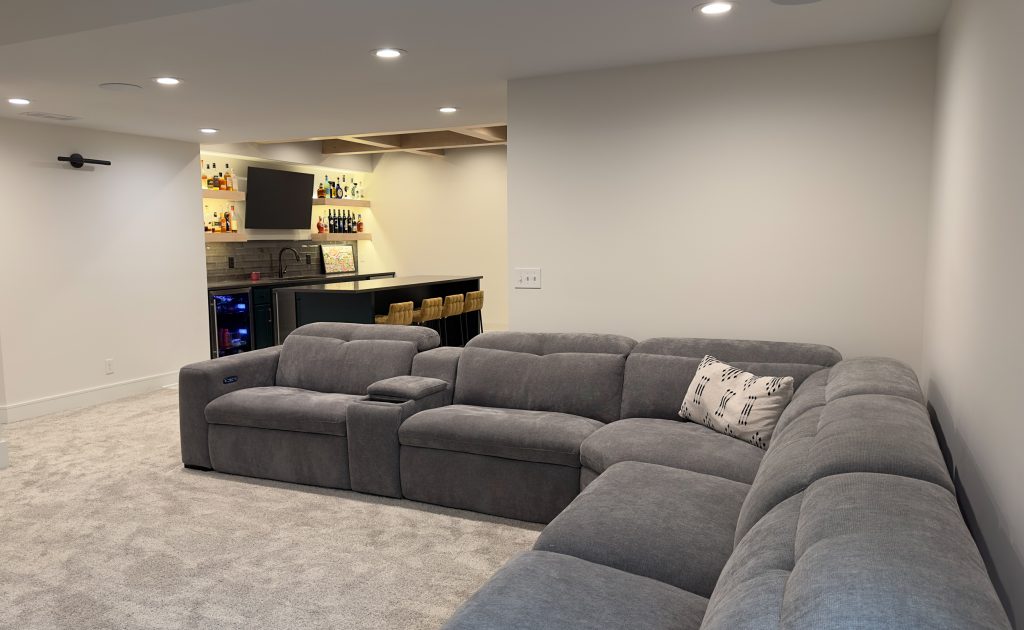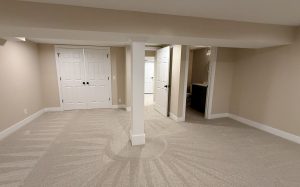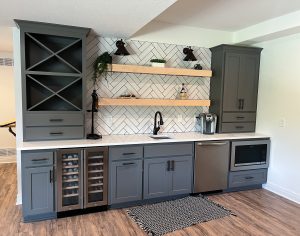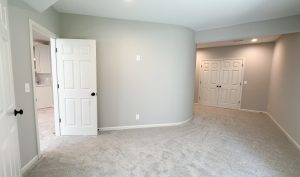Carpet makes a great floor covering for a basement for several reasons. Carpet is warm and soft, which makes it much cozier feeling than a cold and hard cement floor that most basements have as the floor.
The other benefit of carpet is that it does not require a perfectly level surface. Many basements have a very uneven floor, which would make tiling a basement difficult. Carpet, however, is very flexible and can easily be added to very uneven surfaces.
Most people do not even realize that carpet can be added to a basement. They often wonder what type of carpet to choose for their basement. The other concern homeowners have relates to the higher than average humidity found in a basement and the subsequent mildew in their carpet.
Both of those are valid concerns. However, hundreds of thousands of people have carpets in their home with no mold or mildew problems. The following tips will help you choose the best carpet for your basement.

Remove Humidity from Your Basement
The first tip for choosing a carpet in your basement does not even involve choosing a carpet. It involves removing the humidity from your basement. Basements are the most humid location in a home because the lack of airflow and general moisture that occurs while underground. They also have no exposure to sunlight that would burn off humidity.
Other than the humidity, basements may also experience flooding or leaking. The water generally moves through the concrete floor and into the carpet. A high amount of water will destroy even the most moisture resistant carpet. It is recommended that you solve any flooding issues before installing a carpet in your basement due to the high risk of permanent damage to your carpet.
You might not be able to keep water out of your basement, but preventing moisture and mildew in a basement is a relatively simple task. One way to reduce mildew is to consistently keep your ceiling fans in your basement turned on and circulating air through the basement. This will prevent stagnant air and greatly reduces the likelihood of a mold or mildew breakout in your basement carpet.
A dehumidifier in your basement will significantly reduce humidity. Humidity is the leading cause of mildew, so this will greatly reduce the likelihood of mildew forming on the carpet of your basement.
Stopping any flooding problems in your basement is a prerequisite to installing a carpet in your basement. While the humidity reduction methods are not a necessity, they are strongly encouraged. Humidity prevention is more necessary with some types of carpet than other types of carpets. Here are some tips to choosing the best carpet for a basement.
Basement Carpet Fibers
Carpet comes in two types: synthetic (man-made) fibers and natural fibers. Both fiber types have advantages and disadvantages.
Synthetic carpet is the best choice for a basement because of its high breathability. Breathability, in this case, refers to the carpet not retaining moisture. The basement will still have more humidity than other parts of the house despite the humidity removal methods discussed in the above section. A synthetic carpet will help prevent mold and mildew in this higher humidity environment.
Natural carpets do not make a good choice for a basement carpet as they simply absorb too much water. This is unfortunate because natural carpets have been proven to filter the air. However, basements are nothing more than a hole in the ground surrounded by concrete. A hole in the ground will eventually have water seep into it no matter what measures are taken to prevent it. Natural carpets will absorb more of this water, often without the homeowner noticing in the case of wool and increase the humidity. This increased humidity will lead to mold and mildew. It will also destroy the very expensive natural carpet. Neither of those are issues that any homeowner will want to have occur in their basement.
What is the best synthetic carpet to use in a basement?
Synthetic carpet is by far the best carpet to use in a basement. However, there are three different types of synthetic carpet, and each one has advantages and disadvantages.
The three different types of synthetic carpet are nylon, polyester, and Triexta. The different types of synthetic carpets all have their advantages and disadvantages. The main disadvantage with synthetic carpets is that they fade very easily in sunlight. However, most basements have little or no sunlight, so this is not an issue.
The best type of carpet fiber for a basement really depends on what you plan to do with your basement. If you want a general entertainment area, then a nylon carpet will work well in your basement. Nylon carpets have durability, but lack stain resistance and moisture resistance. If you have humidity problems or a high likelihood of spills, then you should avoid a nylon carpet. Nylon is also not recommended if you have pets or small children. Pets and small children are notoriously rough on carpets and just do not mix well with a nylon carpet.
Triexta is the overall best synthetic carpet available on the market. It offers the durability of nylon and has the moisture and stain resistance of polyester. This makes it great for a basement that will get a high amount of foot traffic as it will last longer due to the durability. It also is much softer than the other types of synthetic carpet. Softness is especially important in the basement because of the hardness of the concrete.
Alternatively, Triexta can be installed on the staircase of a low use basement as that staircase may still receive a heavy amount of foot traffic. The basement itself can have a much cheaper nylon or polyester carpet.
Triexta does have one negative, which is the high cost compared to other carpets. Overall, it makes an excellent choice for a basement carpet and the quality of the carpet more than makes up for the higher than average price point.
Polyester carpet, or its variants, are not generally a good choice for a basement carpet because they will look flat after a few months of moderate use. These types of carpets also tend to be thinner than nylon or Triexta. It will basically feel like stepping on a concrete carpet because of the concrete under a basement carpet.
However, if you don’t mind the flat look of carpet, then polyester might be the right carpet for you. Polyester carpets also work well for a basement that will be used as a storage area with minimal use. They also have the lowest price point of any carpet, which does make them an enticing offer. Keep in mind that you do get exactly what you pay for with a polyester carpet, which is a flat and very thin carpet. The low price is convenient in the case of the basement having any water issues as destroying a polyester carpet is not as big of a financial hit as destroying a Triexta carpet.
Overall, choosing the right type of carpet fiber will depend on the purpose of your basement. If you plan to use your basement that for entertainment or other events, then a Triexta carpet will work best. Nylon also works well if you slightly less flexibility, but the price is more ideal. Polyester has the least flexibility.
Carpet Padding
Padding a carpet in other parts of a house is often optional. In a basement, however, it is not an option. The cement foundation will be cold and moist. Cold and moist are not two things you want under your carpet, which makes padding a basement carpet an absolute necessity. The two types of carpet padding available for purchase are polyurethane and rubber pads. These two types are further divided into open cell and closed cell carpet pads.
Closed cell carpet pads should be avoided in the basement as they tend to trap moisture between the pad and concrete. This trapped moisture could form mildew or go into your drywall. Moisture will almost always destroy drywall and lead to even more problems. The good news is that closed cell carpet pads are generally more expensive than open cell carpet pads. Rubber pads are almost exclusively closed cell, which means rubber pads should be avoided in the basement.
Open cell carpets do not trap moisture and are generally cheaper. You should only install open cell carpets in your basement. Also, look for open cell carpets that have an odor guard. This odor guard will eliminate the smells that sometimes occur in a basement. Carpet pads with an odor guard will generally cost an extra one or two dollars per square foot, but this is well worth the cost to protect against nasty odors.
What types of carpet require a carpet pad?
None of the different types of carpet necessarily require a carpet pad. However, a carpet pad provides insulation from the cold concrete. The pad will also prevent some moisture from seeping through to the actual carpet.
Carpet padding is highly suggested for all types of carpet types for those two reasons. Polyester carpet is thin so that the extra carpet padding will add some softness. Nylon carpet has lower moisture resistance, which means a padding will help prevent any mold or mildew problems from arising. Finally, Triexta has some moisture resistance and is a fairly thick carpet, so a padding may not be entirely necessary. However, extra moisture resistance and added softness are always positives for any carpet.
Final Thoughts
Overall, choosing a basement carpet requires more than just selecting a carpet that looks pretty at your local store. It requires finding a carpet that looks good and solves the unique problems that arise in a basement.
Triexta carpeting with a polyurethane and rubber pad will work well for a basement that will get a high amount of use. A nylon carpet is an excellent, and cheaper, alternative to the more expensive Triexta carpet. Finally, a polyester carpet should be avoided except for basements that will receive little to no use. Even for those basements, a nylon carpet may still be better on the staircase because they tend to receive more use and require a more durable carpet to stay in good condition.



